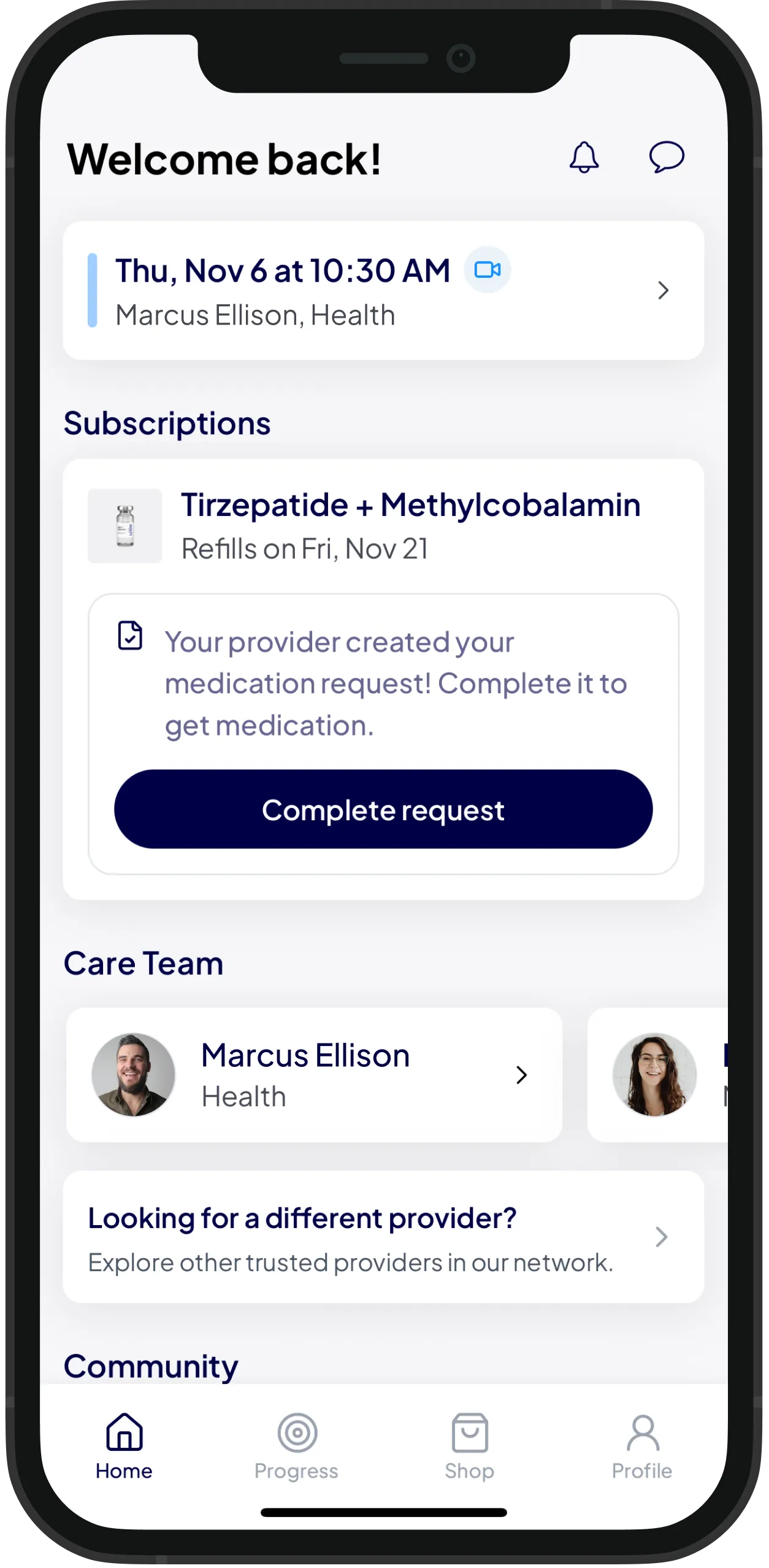Ready to transform your health?
Unlock access to expert guidance and a weight care plan crafted just for you.
Similar Articles
Similar Articles

GLP-1s for Athletes: Performance, Body Composition, and Recovery
GLP-1s for Athletes: Performance, Body Composition, and Recovery

What Labs Should You Monitor on GLP-1s? A Complete Biomarker Guide
What Labs Should You Monitor on GLP-1s? A Complete Biomarker Guide

Does Semaglutide Affect Fertility or Pregnancy?
Does Semaglutide Affect Fertility or Pregnancy?
What is Binge Eating Disorder?
Binge Eating Disorder is a serious and common eating disorder characterized by recurrent episodes of binge eating without the use of compensatory behaviors

Table of Contents
Table of Contents
What is Binge Eating Disorder?
Why is BED underdiagnosed?
Disorders Associated with BED
Consequences of BED
Seeking Treatment for BED
What is Binge Eating Disorder?
Why is BED underdiagnosed?
Disorders Associated with BED
Consequences of BED
Seeking Treatment for BED
What is Binge Eating Disorder?
Binge Eating Disorder (BED) is a serious and common eating disorder characterized by recurrent episodes of binge eating without the use of compensatory behaviors such as purging or excessive exercise. BED is associated with significant physical and psychological morbidity and is the most common eating disorder in the United States, and some studies have reported that it has a lifetime prevalence rate of 5-13%, meaning that this percentage of the population will experience it at some point in their life. Despite its prevalence, BED is often under-diagnosed and undertreated due to a lack of awareness and understanding of the disorder.

Why is BED underdiagnosed?
One reason for the under-diagnosis of BED is that it is often mistaken for overeating or a lack of self-control. Binge eating is defined as consuming a large amount of food in a short period of time and feeling a lack of control over eating during the episode. This behavior is often seen as a moral failing or a lack of discipline, leading to shame and stigma for those who struggle with BED. This can prevent individuals from seeking help and lead to a delay in diagnosis. Reviews on BED epidemiology have revealed that less than half of adults with BED are recognized in healthcare. Minority status, deprivation, violence, trauma, and major mental health illnesses were identified as possible risk factors for developing the disorder. A decade-old survey of physicians reported that more than 40% had never even assessed their patients for BED.
Unlike other eating disorders, the ratio of females to males diagnosed with binge eating disorder is around 6:4. Not to mention the fact that many individuals with BED have comorbid obesity, and are often brushed off in the healthcare setting as needing to engage in some sort of diet and exercise program without receiving evaluation for an underlying disorder (like BED) that needs specific treatment.
Disorders Associated with BED
BED is that it is often comorbid with other mental health disorders, such as depression, anxiety, and substance use. In a 2009 study of 404 patients with BED, 73.8% had at least one additional lifetime psychiatric disorder and 43.1% had at least one current psychiatric disorder.
This can lead to misdiagnosis or a focus on treating the comorbid disorder rather than the BED itself. In addition, BED is more common in individuals who are overweight or obese, and the societal stigma surrounding obesity can also discourage individuals from seeking help for their binge eating, as alluded to above.

Consequences of BED
It is important to accurately diagnose and treat BED in order to improve the physical and mental health of those affected by the disorder. BED is associated with a number of negative physical health consequences, including increased risk of obesity, diabetes, cardiovascular disease, high blood pressure, pain conditions, sleep disorders, irritable bowel syndrome, and even fibromyalgia. It is also associated with significant psychological distress and low self-esteem that can be debilitating.
Seeking Treatment for BED
Treatment for BED often involves a combination of psychotherapy, such as cognitive behavioral therapy, and medications, such as antidepressants. Psychotherapy can help individuals with BED learn coping mechanisms for managing stress and emotions, and can also address any underlying psychological issues that may be contributing to binge eating. Medications can help to alleviate the symptoms of comorbid mental health disorders and may also be helpful in reducing the frequency of binge eating episodes.
Mochi Health Can Help!
In conclusion, Binge Eating Disorder is a common and serious disorder that is often under-diagnosed and undertreated. It is important for individuals struggling with binge eating to seek help in order to improve their physical and mental health. With proper diagnosis and treatment, those with BED can learn to manage their binge eating and improve their overall quality of life. If you are wondering if you may have BED and would like to speak to a non-judgmental obesity medicine provider who may be able to provide a diagnosis and coordinate treatment, Mochi Health can help! Our team of doctors and registered dieticians offer assistance with treating obesity and related conditions, including BED. Check us out here. We can’t wait to meet you.
Sources
American Psychiatric Association. (2013). Diagnostic and statistical manual of mental disorders (5th ed.). Arlington, VA: American Psychiatric Association.
Bray B, Bray C, Bradley R, Zwickey H. Binge Eating Disorder Is a Social Justice Issue: A Cross-Sectional Mixed-Methods Study of Binge Eating Disorder Experts' Opinions. Int J Environ Res Public Health. 2022;19(10):6243. Published 2022 May 20. doi:10.3390/ijerph19106243
Guerdjikova AI, Mori N, Casuto LS, McElroy SL. Binge Eating Disorder. Psychiatr Clin North Am. 2017;40(2):255-266. doi:10.1016/j.psc.2017.01.003
Grilo C.M., White M.A., and Masheb R.M.: DSM-IV psychiatric disorder comorbidity and its correlates in binge eating disorder. Int J Eat Disord 2009; 42: pp. 228-234
What is Binge Eating Disorder?
Binge Eating Disorder (BED) is a serious and common eating disorder characterized by recurrent episodes of binge eating without the use of compensatory behaviors such as purging or excessive exercise. BED is associated with significant physical and psychological morbidity and is the most common eating disorder in the United States, and some studies have reported that it has a lifetime prevalence rate of 5-13%, meaning that this percentage of the population will experience it at some point in their life. Despite its prevalence, BED is often under-diagnosed and undertreated due to a lack of awareness and understanding of the disorder.

Why is BED underdiagnosed?
One reason for the under-diagnosis of BED is that it is often mistaken for overeating or a lack of self-control. Binge eating is defined as consuming a large amount of food in a short period of time and feeling a lack of control over eating during the episode. This behavior is often seen as a moral failing or a lack of discipline, leading to shame and stigma for those who struggle with BED. This can prevent individuals from seeking help and lead to a delay in diagnosis. Reviews on BED epidemiology have revealed that less than half of adults with BED are recognized in healthcare. Minority status, deprivation, violence, trauma, and major mental health illnesses were identified as possible risk factors for developing the disorder. A decade-old survey of physicians reported that more than 40% had never even assessed their patients for BED.
Unlike other eating disorders, the ratio of females to males diagnosed with binge eating disorder is around 6:4. Not to mention the fact that many individuals with BED have comorbid obesity, and are often brushed off in the healthcare setting as needing to engage in some sort of diet and exercise program without receiving evaluation for an underlying disorder (like BED) that needs specific treatment.
Disorders Associated with BED
BED is that it is often comorbid with other mental health disorders, such as depression, anxiety, and substance use. In a 2009 study of 404 patients with BED, 73.8% had at least one additional lifetime psychiatric disorder and 43.1% had at least one current psychiatric disorder.
This can lead to misdiagnosis or a focus on treating the comorbid disorder rather than the BED itself. In addition, BED is more common in individuals who are overweight or obese, and the societal stigma surrounding obesity can also discourage individuals from seeking help for their binge eating, as alluded to above.

Consequences of BED
It is important to accurately diagnose and treat BED in order to improve the physical and mental health of those affected by the disorder. BED is associated with a number of negative physical health consequences, including increased risk of obesity, diabetes, cardiovascular disease, high blood pressure, pain conditions, sleep disorders, irritable bowel syndrome, and even fibromyalgia. It is also associated with significant psychological distress and low self-esteem that can be debilitating.
Seeking Treatment for BED
Treatment for BED often involves a combination of psychotherapy, such as cognitive behavioral therapy, and medications, such as antidepressants. Psychotherapy can help individuals with BED learn coping mechanisms for managing stress and emotions, and can also address any underlying psychological issues that may be contributing to binge eating. Medications can help to alleviate the symptoms of comorbid mental health disorders and may also be helpful in reducing the frequency of binge eating episodes.
Mochi Health Can Help!
In conclusion, Binge Eating Disorder is a common and serious disorder that is often under-diagnosed and undertreated. It is important for individuals struggling with binge eating to seek help in order to improve their physical and mental health. With proper diagnosis and treatment, those with BED can learn to manage their binge eating and improve their overall quality of life. If you are wondering if you may have BED and would like to speak to a non-judgmental obesity medicine provider who may be able to provide a diagnosis and coordinate treatment, Mochi Health can help! Our team of doctors and registered dieticians offer assistance with treating obesity and related conditions, including BED. Check us out here. We can’t wait to meet you.
Sources
American Psychiatric Association. (2013). Diagnostic and statistical manual of mental disorders (5th ed.). Arlington, VA: American Psychiatric Association.
Bray B, Bray C, Bradley R, Zwickey H. Binge Eating Disorder Is a Social Justice Issue: A Cross-Sectional Mixed-Methods Study of Binge Eating Disorder Experts' Opinions. Int J Environ Res Public Health. 2022;19(10):6243. Published 2022 May 20. doi:10.3390/ijerph19106243
Guerdjikova AI, Mori N, Casuto LS, McElroy SL. Binge Eating Disorder. Psychiatr Clin North Am. 2017;40(2):255-266. doi:10.1016/j.psc.2017.01.003
Grilo C.M., White M.A., and Masheb R.M.: DSM-IV psychiatric disorder comorbidity and its correlates in binge eating disorder. Int J Eat Disord 2009; 42: pp. 228-234
Read next
Ready to transform your health?
Unlock access to expert guidance and a weight care plan crafted just for you.

Ready to transform your health?
Unlock access to expert guidance and a weight care plan crafted just for you.

Ready to transform your health?
Unlock access to expert guidance and a weight care plan crafted just for you.


© 2026 Mochi Health
All professional medical services are provided by licensed physicians and clinicians affiliated with independently owned and operated professional practices. Mochi Health Corp. provides administrative and technology services to affiliated medical practices it supports, and does not provide any professional medical services itself.


© 2026 Mochi Health
All professional medical services are provided by licensed physicians and clinicians affiliated with independently owned and operated professional practices. Mochi Health Corp. provides administrative and technology services to affiliated medical practices it supports, and does not provide any professional medical services itself.


© 2026 Mochi Health
All professional medical services are provided by licensed physicians and clinicians affiliated with independently owned and operated professional practices. Mochi Health Corp. provides administrative and technology services to affiliated medical practices it supports, and does not provide any professional medical services itself.


















